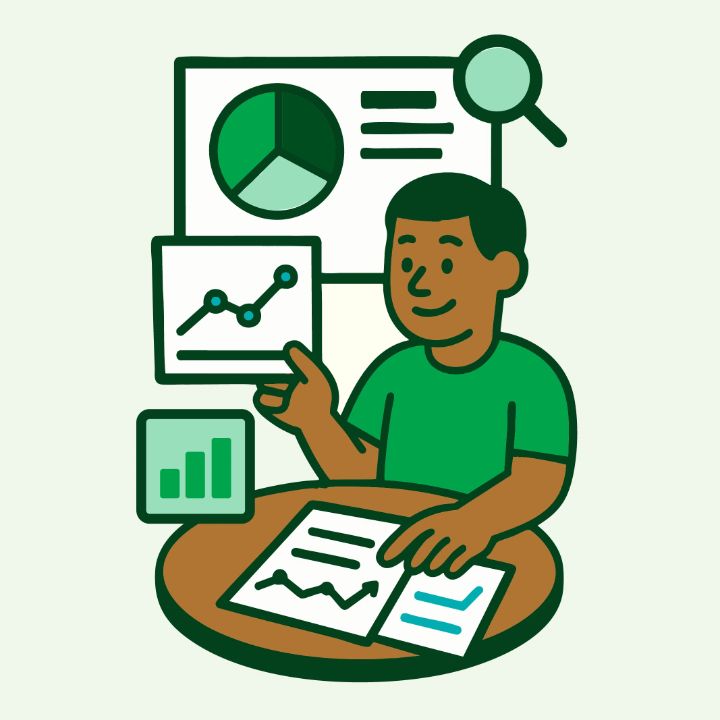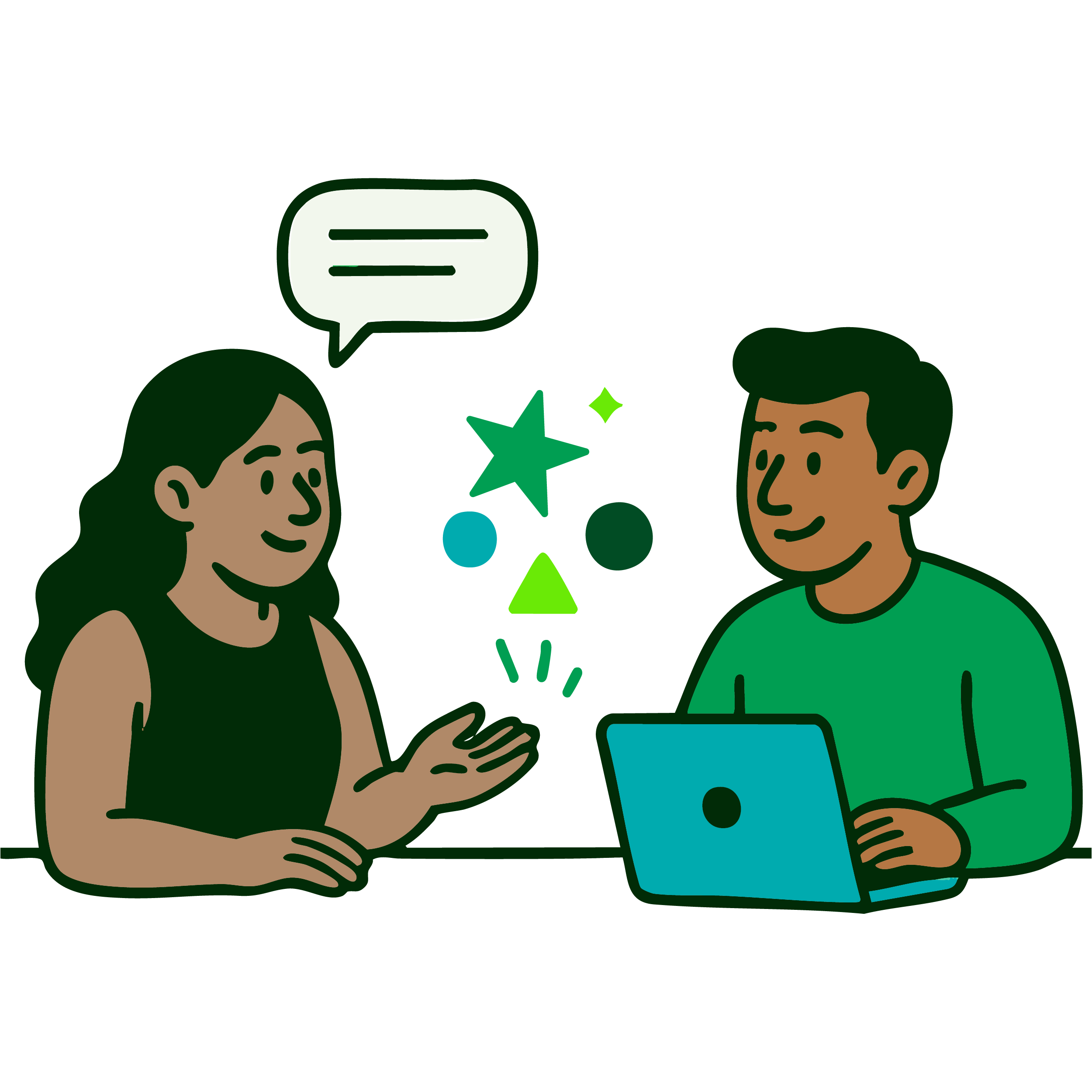AI Coaching ROI & Business Case
A Practical Guide for HR and Finance Leaders
BROWSE TOPICS
TL;DR (for busy HR and finance leaders)
AI coaching makes people development measurable, scalable, and strategically defensible.
It drives every metric talent leaders already care about—retention, engagement, and performance—and finally connects them to real behavior change at the individual and team level.
Because Cloverleaf’s AI coach is embedded in everyday tools, it captures development as it happens, not months later in a survey.
That means you can see, in real time, how coaching is improving communication, feedback, trust, and leadership effectiveness across your organization.
The ROI of AI coaching is skill development made visible—proven through daily behavior change, measurable engagement, and continuous growth in leadership and collaboration..
Organizations using Cloverleaf’s AI coaching are already seeing:
- 86% performance improvement
- 2× higher engagement with development tools
- ⅔ of learnings are team-based
- 45,000+ teams building trust and better collaboration
AI coaching is no longer a “nice to have.”
It’s a strategic advantage that elevates HR and talent leaders into a true business partner role—turning human potential into measurable performance.
What does measurable ROI look like for AI coaching?
AI coaching drives all the metrics HR and finance leaders already track—retention, engagement, and performance—but it does so by improving the human foundations those outcomes depend on.
Because an AI coach is embedded with employees as they work, it can provide insight far beyond the surveys and anecdotal feedback that HR and learning leaders have traditionally relied on to prove their programs are effective. It captures development as it happens, in the flow of work.
The ROI of AI coaching is skill development in every employee—proven through measurable behavior change reflected in usage patterns, feedback quality, and communication improvements across teams.
Think of it as having a coach on your side—helping people communicate better, handle feedback with clarity, and navigate tough moments with empathy. Those everyday micro-interactions build emotional intelligence, psychological safety, and trust—drivers of measurable performance and retention.
Those outcomes—trust, feedback quality, and communication flow—are the foundation of measurable business impact, driving higher retention, faster ramp, fewer escalations, and stronger performance.

Why is ROI a critical lens for evaluating AI coaching?
Proving behavior change should be a top requirement for evaluating any AI coach.
If a tool is genuinely helping people grow, you’ll see it in how they use it: daily, contextually, and repeatedly. Those usage signals—message rewrites, meeting debriefs, feedback phrasing—become real-time data on growth and development.
For the first time, learning activity can be measured by applied behavior, not self-reporting.
This shift transforms HR’s credibility inside the business.
Talent development is no longer a “soft metric” discipline—it’s a measurable growth engine.
- Usage data shows where coaching is being applied.
- Behavioral signals reveal where communication, feedback, and collaboration are improving.
- Aggregated insights make culture and leadership growth visible across teams.
Too much of HR and the talent development function has been seen as a cost center, not a critical business partner. Being able to define ROI—and, as Stephen Covey said, begin with the end in mind—is how we change that.
When you can point to hard data that shows people are developing, conversations are improving, and managers are growing—ROI stops being abstract. It becomes visible, defensible, and integral to how HR earns its strategic seat at the table.

What outcomes demonstrate measurable ROI?
First and foremost, usage matters.
If an AI coach is truly helpful, people will use it. Gone are the days of single-digit login rates—daily and weekly engagement should become the norm.
But usage is only the leading indicator.
The real ROI comes from measurable behavior change—finally visible without surveys or self-reporting.
Leading Indicators (People Data → Behavior Data)
- Increases in coaching moments and conversation quality.
- More frequent and constructive feedback loops.
- Higher collaboration between teams and fewer interpersonal escalations.
Lagging Indicators (Behavior Data → Business Impact)
- Retention: Reduced regrettable attrition and manager turnover.
- Performance: 86% of users report measurable performance improvement.
- Efficiency: Faster ramp for new hires and shorter decision cycles.
- Leadership Growth: Clear competency gains in feedback, trust, and communication.
- Team Health: More effective meetings, fewer conflicts, smoother handoffs.
Because Cloverleaf’s AI coach can integrates directly with performance systems, feedback tools, and collaboration apps, the outcomes can also be customized to what matters most to your organization—whether that’s leadership competency growth, improved review quality, or stronger succession planning.
AI coaching is powerful enough to turn learning into applied growth—visible in usage, measurable in behavior change, and reflected in performance.

How should you build a business case for AI coaching?
When building a business case for AI coaching, start with what’s already proven: coaching delivers measurable growth.
The question is no longer if it works—it’s how to scale it, measure it, and sustain it across the organization.
AI coaching strengthens the business case in two distinct ways:
1. Supplementing existing human coaching
If your organization already offers human coaching or leadership programs, AI coaching amplifies that investment.
It extends coaching reach between sessions, sustains behavior change, and provides measurable signals that human programs can’t capture alone.
You can measure ROI by comparing:
- Promotion and internal mobility rates among coached vs. uncoached employees.
- Leadership competency growth across key behaviors like feedback, trust, and collaboration.
- Manager effectiveness or engagement deltas in teams using AI coaching.
AI coaching acts as a multiplier—extending the reach of human coaches, reinforcing learnings daily, and ensuring the ROI of your existing programs compounds over time.
2. Scaling coaching where no program exists
For organizations without a traditional coaching model, AI coaching provides an immediate path to leadership development at scale.
It builds bench strength and succession readiness—daily, affordably, and automatically.
Track ROI through:
- Growth in defined skills and competencies via performance reviews or 360 feedback.
- Retention and engagement among new or first-time managers.
- Faster ramp and improved collaboration for new hires and cross-functional teams.
Industry-specific impact examples:
- Sales teams see improved conversion rates and pipeline health.
- Customer service teams see higher satisfaction and fewer escalations.
Connecting People Growth to Business Performance.
For finance leaders, these outcomes translate directly to cost savings and productivity gains:
- Lower attrition = reduced replacement and recruiting costs.
- Shorter ramp = faster time to productivity.
- Fewer conflicts = reduced ER interventions and rework.
- Better decisions = faster cycles and higher throughput.
Together, these factors compound into an undeniable ROI story—one grounded in daily measurable behavior, visible growth, and reduced organizational friction.
AI coaching acts as a multiplier—extending the reach of human coaches, reinforcing learnings daily, and ensuring the ROI of your existing programs compounds over time.

The most common objections HR and Finance Leaders Raise About AI Coaching ROI, and How to Address Them
If you’re responsible for proving the business value of HR and talent investments, skepticism about AI coaching isn’t just reasonable—it’s essential.
Here’s how to address the five most common concerns you’ll hear from peers, executives, and finance partners.
1. “Is it safe?”
You can assume your IT and legal teams will ask this first—and they should.
Cloverleaf’s AI Coach meets enterprise-grade security and compliance standards from day one:
- SOC 2 Type II, ISO 27001, and GDPR-aligned
- Transparent, anonymized data flows
- No data used to train external LLMs
- Full admin oversight with audit trails and retention controls
Why it matters for finance: You’re reducing vendor risk.
Data privacy compliance is already built in—meaning fewer procurement delays, lower security risk, and faster implementation ROI.
Security is table stakes. Trust is built through transparency—what data is collected, how it’s used, and who has access.
2. “Is it replacing human connection?”
For HR leaders, this is the heart of the question:
Will AI coaching make development more human—or less?
As Cloverleaf’s we believe: Technology doesn’t replace human coaching—it amplifies it.
Cloverleaf’s AI coach extends the impact of every leadership or learning investment. It reinforces lessons between sessions, helps managers prepare for real conversations, and gives every employee a coach in their corner.
For HR: It sustains growth between workshops and sessions.
For Finance: It increases ROI by maximizing the shelf life of every learning program.
AI coaching doesn’t replace relationships—it strengthens them at scale.
3. “Can we prove it works?”
This is where AI coaching moves from “innovation” to investment with returns.
The data already speaks for itself:
- 86% of users report measurable performance improvement
- 2× higher engagement with development tools
- ⅔ of learning is team-based, not individual
That means behavior change is not theoretical—it’s visible in real usage patterns and team outcomes.
You can finally show ROI on leadership and culture initiatives—linking coaching engagement directly to retention, performance, and collaboration metrics.
4. “Can’t ChatGPT already do this?”
This is one of the most common misconceptions—especially from tech-savvy leaders who’ve experimented with LLM’s.
It’s true: tools like ChatGPT can simulate advice.
But they lack the context, continuity, and credibility that make real coaching work.
Cloverleaf’s AI coach goes far beyond generic prompts:
- It uses validated behavioral assessments and team data to tailor guidance.
- It delivers insights in the tools employees already use—Slack, Teams, Calendar, and Email.
- It tracks applied growth over time, turning advice into measurable development.
Even custom GPTs still require manual input, lack team context, and are unable to measure outcomes.
5. “What about empathy?”
This question cuts to the core of HR’s mission: how do we scale people development without losing humanity?
Cloverleaf’s answer—and origin story—is empathy itself.
The platform was built to help people understand and value their differences, using behavioral science to improve collaboration and connection.
“AI shouldn’t just make us more efficient—it should make us more understanding.”
Every insight delivered by Cloverleaf is designed to build emotional intelligence, psychological safety, and trust—the building blocks of high-performing, human-centered teams.
Empathy isn’t just a value—it’s a measurable performance driver. Teams that understand each other communicate better, resolve conflict faster, and retain talent longer.

Why AI Coaching Will Soon Be Financially Impossible to Ignore
Three major disruptions are rewriting the economics of talent development—and together, they make AI coaching not just a smart investment, but a financial inevitability.
Consolidation of the HR tech stack
HR and finance leaders are under pressure to simplify, not expand, their tech ecosystems. The expectation now: fewer tools that do more, with measurable, cross-functional outcomes.
AI coaching unifies assessment data, performance insights, and daily behavioral nudges into one scalable system—turning scattered people data into growth that’s visible and reportable.
The accelerating half-life of skills
Technical skills now expire in months. What endures—and differentiates—are human skills: collaboration, leadership, feedback, adaptability.
AI coaching builds these capabilities daily, not quarterly, helping organizations keep pace with change and develop the uniquely human competencies that automation can’t replace.
The rise of reliable, affordable AI
The technology has finally caught up to the vision Cloverleaf set a decade ago. Models are now advanced enough—and cost-effective enough—to deliver personalized, real-time coaching at scale, grounded in validated behavioral data.
When we began this journey, we believed everyone should have their own coach in their corner—and technology would make it possible. Now, the technology has caught up to the vision. The disruption is here.

